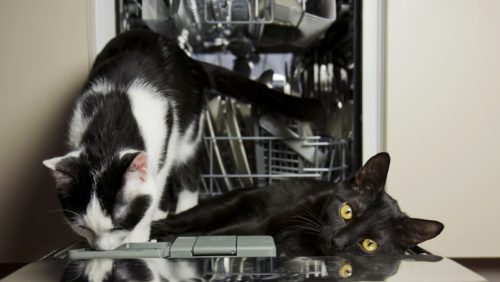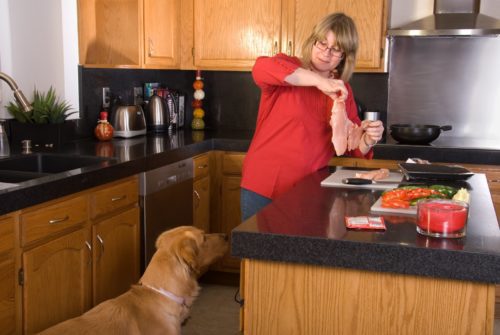Pet Safety During Construction: Furry Preparations
March 20, 2018This article has been peer-reviewed by Dr. Amanda Zetwo, DVM.
Whether they have fur, feathers, or scales, many of us have developed that warm, soft spot in our hearts that led us to the adoption of our most cherished companions. In fact, according to the most recent National Pet Owners Survey conducted by the APPA, over 85 million families in the United States own pets! That means almost 70% of US families own a pet! We are clearly a nation that values our non-human best friends and what they do for the quality of our lives.
If you have a pet and you’re refacing your kitchen, pet safety during construction is likely one of your first concerns.
If your kitchen cabinets look like they’re from the ‘70s and you’re just not into that, don’t worry, there’s good news! You can have your kitchen redone without compromising the health and safety of your animals! Below are a few safeguards to keep in place to maintain pet safety during construction.

Pet Safety During Construction: Tips
Containment: Preventing Fear
As a pet owner, you’ve probably witnessed that your pet’s fear or anxiety can lead them to act unintentionally dangerously. As an example, maybe your dog has escaped because fireworks were scary and loud or maybe they’ve tried to chew through a door due to a frightening faulty fire alarm. Perhaps your cat became alarmed and frantic and then fell off of the counter. All of these actions are, at their core, fear-based and can have dire consequences ranging from cuts to infections to broken bones and more. The best news? These injuries are mostly avoidable with the right updates to your home!
With all of the loud noises, new people, and unknown smells that come with the construction process, pets can become overwhelmed and fearful. Here are some tips for pet safety during construction, particularly when it comes to preventing scared pets from incurring accidental injuries:
- Ensure all of your animals are safely and securely contained away from the action. As the American Veterinary Medical Association outlines in an article discussing a safe holiday for animals:
“If you know your dog or cat is nervous when people visit your home, put him/her in another room or a crate with a favorite toy. This will reduce the emotional stress on your pet and protect your guests from possible injury.”
This tip also applies to construction but with the added caveat that regardless of whether your animal is nervous around guests, they should still stay contained. Kennels, beds, and comfort items such as toys belong kept in a safe room with the door closed and in a room as far away from construction as possible.
- The enclosed quiet space should feature appropriate temperature control (such as heat in the winter or air conditioning in the summer).
- If you own multiple pets, make sure they are compatible to be left in a room alone together before closing them in a room together unsupervised for a few hours at a time.
- Remember that pets should always have access to at least their water while secluded. Failure to provide adequate water can lead to dehydration, which can lead to acute kidney damage (and more) or even kidney failure, both of which can, unfortunately, result in death. Talk to your veterinarian about how, when, and what food your pet should have available.
- Dogs should be allowed to go outside for bathroom breaks every eight hours maximum (but the more often the better!) to prevent an increased risk of urinary tract infections. Cats should have their litter pans accessible and clean.
- If your dog or cat is incredibly sensitive, particularly to sounds, leaving a TV or radio on in the room in which they’re enclosed can provide helpful and soothing distraction.
- If pets are anxious to begin with, set up an appointment with your vet to discuss options such as anxiolytic (anti-anxiety) medications that could be used short-term for the duration of the project to ensure your pet’s fear doesn’t cause them any unintentional bodily harm.
- If your pet has medical complications including diabetes or a seizure disorder (or any serious issue), consider boarding them at your local animal hospital instead. Under the watchful eye of medical professionals, they can remain safe and you can get your remodel finished!

Debris: Removing Foreign Materials
During your kitchen remodeling project, when the crew goes home each night, either you or the crew needs to clean, sweep or vacuum the floor and clear the space of any remaining debris. Debris could be potentially dangerous for your pet because:
- Curious pets may ingest hazardous construction materials or inhale construction dust that can be unsafe.
- Pets might also accidentally tread on sharp detritus such as remaining wood splinters, nails, screws, and more.
A quality company will leave the room clean each day, making it a safer place for people and pets. Still, it’s always best to keep pets out of the work area altogether until the project is done.
Peacemaking: Other Helpful Tips for Soothing Pets
Even if your pets are safely enclosed in a room, there are products on the market to keep them calm and happy. Pheromones like Feliway for cats (available as a spray, room diffusers, and other additional preparations) and Adaptil for dogs are astoundingly successful over-the-counter options that are well-praised by veterinary professionals and owners alike. If you have questions about what is available for your pets, always ask your vet!
Sensitivity: Feathered Friends
Birds have unique issues and are hypersensitive to certain chemicals and materials, including glues, paints, aerosolized products, and a majority of building materials. These products can even be fatal to birds. Even if kept in another room, birds may still be in peril due to home ventilation systems. If you can, and if the bird must stay in your home, adding an air purifier is optimal. Most recommended, however, is to board your bird safely away from the construction.
Talk to your renovation team in advance to ensure materials to be used are safe for your bird (or other pets!). If not, ask if alternative materials are available. To keep your process moving forward, address any concerns about materials being pet safe in your initial meetings with your renovation team.
Again, the safest options for birds during renovations, where possible, is to find a willing friend, family member, or boarding center with a bird-safe location to temporarily house your feathered pal until the work is complete.
Tanked: Fish Care
Fish tanks should moved into a closed-off room far away from any construction. Any chemicals or debris that can enter fish tanks either directly or through the air can change water pH or cause toxicities that can be deadly to fish and other aquatic pets. The new location for the tank should also be appropriately temperature controlled for your fish.
Preparations: Talk to Your Vet
Above all else, talk to your veterinarian at least a month prior to the beginning of construction. Your veterinarian can address any specific health needs your pet may face during renovations. Also be sure to contact your veterinarian immediately during construction if your pet shows any health changes or abnormalities!
Pet safety during construction is possible with the proper preparations, modifications, and of course, your veterinary team on board! Enjoy those new cabinets and your best friend’s health!
Note: All external links included in this article are either peer-reviewed by qualified veterinary professionals or an article featured on the website of a qualified veterinary professional.
Michelle Biller, VMT is a veterinary technologist with a Bachelors of Science in Veterinary Medical Technology. Prior to health issues, Michelle was a proud and dedicated registered veterinary nurse (MD) and certified veterinary nurse (PA) with seven years of varying experiences that included emergency veterinary medicine, clinical veterinary medicine, and veterinary laboratory medicine. Michelle currently serves as the Editor in Chief for a website dedicated to geeky passions. Her time is divided between professional writing, geocaching, volunteering with injured raptors, spending time with her cat and husband, and chasing other miscellaneous and atypical passions.







